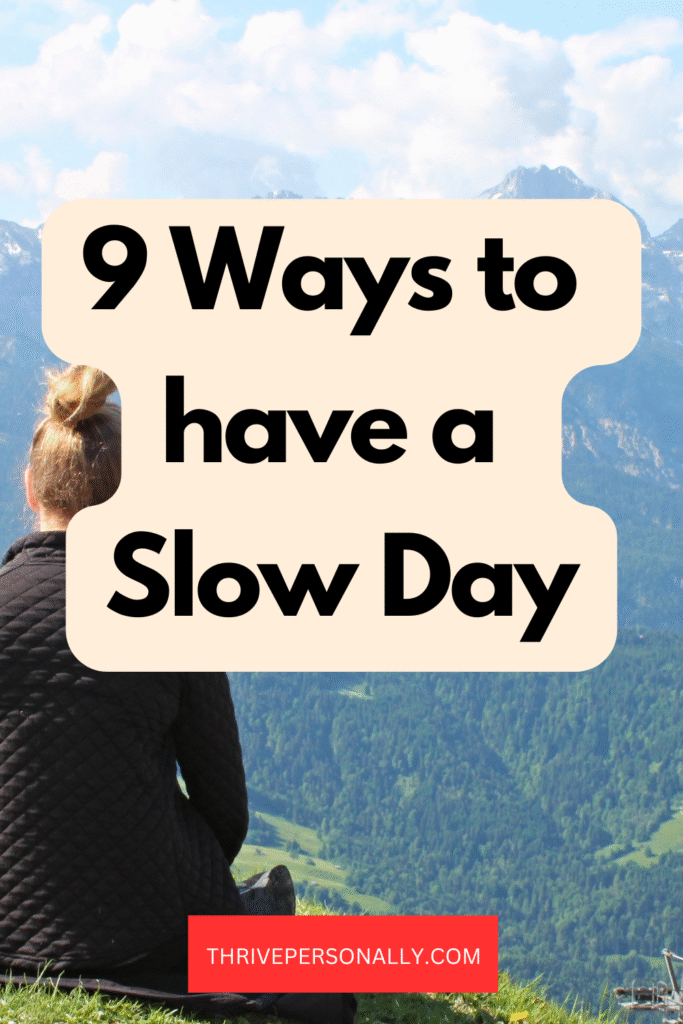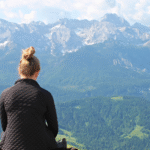One morning I woke with no alarm and no rush. No urgent messages. No to-do list waiting to be tackled. I stayed in bed for a few minutes, listening to the hush and faint sounds outside. Sunlight slipped through the curtains in soft streaks, and I realized how rarely I paused to notice something so small.
For years, my life was ruled by lists, deadlines, and the constant push to be productive. My days blurred together like a fast-forward reel. But that morning, I gave myself the rare luxury of time — not just physically, but mentally. It felt like my body and mind were breathing together again.
You may not realize how much speed has become the default mode of living. Success often seems measured by how much we can get done in the shortest time. We eat quickly, speak quickly, scroll quickly, even sleep quickly. But moving fast isn’t free — it robs us of feeling moments fully. We live less in the present because our minds are racing toward the future.
9 Ways to Have a Slow Day
1. Wake Up Without Rushing
How you start your morning often sets the tone for the rest of the day. If you begin in a rush, stress is likely to follow you for hours.
A slow day starts with giving yourself time in the morning. That doesn’t mean you have to wake up earlier — just avoid hitting the ground running the second you open your eyes. Resist the urge to check your phone right away. Instead, stretch, sit quietly, or simply breathe. Avoid scheduling early commitments on slow days so your body and mind can transition smoothly from rest to activity.
Read also: 10 Guidelines for Creating Better Sleeping Habits
2. Keep Your Schedule Light
The quickest way to make a day feel crowded is to overfill it. When your calendar is jam-packed, your mind will race ahead instead of staying in the moment.
On a slow day, choose one or two main activities. That doesn’t mean you’re being lazy — it means you’re leaving yourself the mental space to be fully present. Keeping your schedule light also leaves room for spontaneous moments, like taking a walk, reading a few pages of a book, or having an unhurried conversation without checking the clock.
Read also: 15 Minimalist Habits to Simplify Your Life
3. Slow Your Movements
We often think doing things faster is better, but slowing your physical pace changes how you experience them. When cooking, folding laundry, or eating, try moving at a steady, comfortable rhythm. Pay attention to the smell, sound, and feel of what you’re doing.
Even research from Harvard Health shows that slowing down daily routines can reduce stress and improve mental well-being. Something as simple as walking at half your usual speed can heighten your senses and ground you in the present moment.
4. Spend a Moment in Silence
A slow day isn’t silent from start to finish, but it’s the perfect opportunity to give yourself at least one quiet moment. This might mean turning off music, muting notifications, or stepping away from a noisy environment.
Quiet allows your brain to rest from constant stimulation and focus in one direction instead of being pulled in many. Over time, these still moments can sharpen concentration and lower stress, according to the American Psychological Association.
5. Spend Time Outdoors
There’s something about being outside that naturally slows you down. Sitting in a park, standing on your balcony, or strolling by a river — fresh air and natural light have a way of encouraging relaxation.
Research from the University of Michigan found that just 20 minutes in nature can lower cortisol, the stress hormone, and boost your mood. You don’t have to climb a mountain — simply being where you can see the sky and feel the wind is enough.
Read also: 10 Alternatives to Talk Therapy You Should Consider
6. Practice Single-Tasking
One reason days fly by is our habit of multitasking — eating lunch while answering emails, or watching a show while texting. It may feel efficient, but it often leaves us more drained because our focus is divided.
On a slow day, give your full attention to one task at a time. Eat without scrolling. Listen fully when someone talks. This concentrated presence can make your time feel richer and your day longer.
7. Pause Between Activities
Instead of jumping from one thing to the next, insert small pauses. Rest for a minute after finishing a task. Take a few deep breaths before starting the next.
When you stop trying to pack every minute, you’ll feel less time pressure and more in control. Pauses give you a chance to absorb what you just did before moving on.
8. Take a Digital Break
Constant notifications and endless scrolling keep your brain in high-alert mode. Even without urgent news, the habit of checking your phone speeds up your internal rhythm.
On your slow day, limit your screen time or set offline hours. It may feel strange at first, but soon your thoughts and breathing will start to match a calmer, slower pace.
9. End Your Day Gently
How you close the day matters just as much as how you start it. Avoid ending with another errand or mindless scrolling. Instead, finish with something relaxing — reading a few pages, reflecting on your day, or listening to soft music.
Ending gently signals to your body that it’s time to rest, making it easier to fall asleep and stay asleep.
Closing Thoughts
The world will never stop encouraging you to go faster, but you have the power to set your own pace. Life isn’t only about what’s next — it’s also about where you are now. When you slow down, you not only remember more of your life but also feel like you’re truly living it.
You don’t need to escape the city or take time off work to live slower. You just need to decide how you’ll use your time. Even one slow day a week can shift how you see the rest of your life — and make you grateful you didn’t let it slip through your fingers.
Save the pin for later


